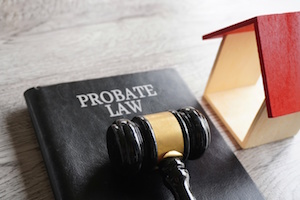Understanding the machinations of probate and its bearing on estate management is crucial to anyone who aims to responsibly navigate the waters of inheritance, whether as a potential benefactor or a beneficiary. At its heart, probate is a legal process that ascertains the validity of a will, values assets, and ensures that all debts and taxes are settled before the remaining assets are allocated as specified in the decedent’s will. The impetus for this process can stem from varied factors including authenticated wills, will contests, and intestate circumstances, the repercussions of which predominantly hinge on the size of the estate and regional law. This article is dedicated to understanding when and why does a will go to probate so keep reading to learn more!
The Basics of Probate
Demystifying Probate: Why Does A Will Go To Probate?
Probate – A puzzle for some, an unfamiliar term for others. This procedure has an undeniable significance in the world of law and wealth management. Yet, many folks find themselves not quite understanding what it is, how it works, or why it is necessary. Here’s a dig into the fascinating world of probate and its essential role in managing and distributing an individual’s estate after death.
Probate, in its simplest form, is a legal procedure that ensures the last will of a deceased individual—or decedent—is verified and executed properly. In instances where there is no will to speak of, probate ensures just and lawful distribution of assets. But why, you may wonder, is such a legal process necessary, and why does a will go to probate?
In our ever-evolving economic ecosystem, wealth management and rightful property distribution play crucial roles, more so after the demise of the stakeholder. Probate is that thread that weaves order amidst potential chaos. It stands guard against fraudulent claims, ensuring that the decedent’s creditors are paid off, and the wealth is rightly distributed according to the decedent’s wishes.
At the core of probate is a clear aim—ensuring fairness. A court oversees the action, confirming that all bills and taxes from the estate are paid, fending off any unsuitable claims, and confirming that the remaining assets are transferred to the proper parties.
Often, probate can become a complex process. Estates with numerous assets, family dynamics, and various legal intricacies typically demand an adept probate attorney to navigate the process. The goal is to ensure a smooth sail for the decedent’s beneficiaries, eliminating the burdens of property and tax-related duties.
Probate also becomes crucial amidst disputes, making it a reliable shield against domestic and financial discord. If a family member disputes the will, it is probate that steps in to ensure a legal and credible resolution, protecting the assets from becoming a bone of contention.
It is evident, then, that probate plays a pivotal role in wealth management post-death. It keeps intact the very purpose of wealth—the power to bring financial security and happiness to the ones we care about, even when we’re no longer around.
So, whether you’re a budding entrepreneur riding the wave of success, an established business professional with multiple assets in your portfolio, or any individual who cares about securing their family’s future—understanding probate is non-negotiable. It serves as a beacon, guiding your wealth to its rightful inheritors and ensuring your legacy lives on, unblemished.
Factors that Trigger Reasons Why Does A Will Go To Probate
Probate, as delineated above, is an instrumental process in the realm of wealth management and property distribution. Now, let’s shed light on the circumstances under which a will might have to go through probate.
Even in the meticulously pre-planned instances of wealth transfer, probate is frequently inevitable. When an individual passes away leaving behind a last will, the probate process commences almost immediately with presenting the will to the probate court. The circumstance where a will goes through probate could hinge upon diverse factors including the will’s clarity, comprehensiveness, legal standing, and the cooperation level between concerned parties.
Unclear, incomplete, or disputable wills are prime contenders for the probate process. If a will is written with considerable ambiguity, it might require court intervention to decipher its true intent. Hence, it’s imperatively incumbent upon the will’s author to elucidate their wishes with unequivocal clarity to circumnavigate this predicament.
Similarly, a will devoid of instructions addressing all assets, particularly those acquired post-will creation without subsequent amendments, can propel a will into probate. To avoid this scenario, coherent anticipatory planning that also accommodates potential postscript asset acquisition cannot be stressed enough.
Furthermore, a will might also be drawn into probate by virtue of its legal standing. In some states, certain will formats, particularly holographic or handwritten wills barely witnessed, may not endure the legal test and may necessitate probate. Therefore, entrepreneurially informed individuals inclined towards a proficient exit strategy should acquaint themselves with their state laws concerning will formats to anticipate the potential of probate.
To amplify, a will’s engagement with probate could equally be determined by the degree of conformity amongst the involved factions. If beneficiaries are dissatisfied with the allocation or challenge the legality of the will asserting coercion, fraud, or the testator’s unsound mental state, probate becomes indisputable as it provides an arena for conflict resolution.
In conclusion, the probate process remains an integral part of wealth transition, despite its intricate and occasionally tension-fraught nature. By understanding the diverse ways in why does a will go to probate, individuals can prepare more solidly for seamless wealth transfer, harmonize estate planning, and ensure their legacy lives on exactly as envisioned, without the harrowing and often-rancorous complications of probate.

The Probate Process and Timeline
Moving forward in the probate process, we need to comprehend the steps involved along with the timeline. As impeccably prepared professionals, we cannot fully anticipate the timeline because it’s contingent on a myriad of factors. Yet, we can effectively map a rough sketch of the probate path.
Upon the death of an individual, a probate case must be initiated in the decedent’s domicile county or principal property location if interstate. This commencing step is the filing of the original will and a petition for probate. Once the court approves the petition, the personal representative or executor, usually named in the deceased’s will, is officially appointed.
The next step in the probate process demands comprehensive accounting. The executor is tasked with identifying the decedent’s assets and presenting an inventory to the probate court. This involves tracking down physical property, bank account balances, and other assets. Neglecting any asset, no matter how trivial it may seem, can derail the process and even lead to legal ramifications. As experienced business keens, we understand the criticality of accuracy in any kind of inventory accounting.
Remarkably, outstanding debts, bills, and taxes of the deceased are also tapped into during the probate process. The executor’s duties and responsibilities include settling these debts using estate funds. If the decedent’s debt surpasses his or her estate’s value, the state laws will dictate the payment order. It also might require selling assets from the estate to cover the debts.
The executor’s role does not end with debt settlement. He or she authors an accounting report documenting all the financial actions taken on behalf of the estate. Beneficiaries then review and sign off on this document, enabling the executor to finally distribute assets according to the will’s instructions, marking the completion of probate.
The average duration of the probate process depends on the state and the particularities of the estate, but it can span anywhere from 6 months to 2 years. However, factors like disputes over the will or challenges in estate planning can push this timeline beyond average boundaries, which stresses the importance of having a well-thought-out and documented will in place.
Decoding the intricacies of a probate process is no easy feat. Complete comprehension of processes, rules, and exceptions pertinent to different states makes for superior strategizing. This helps us avoid potential pitfalls and seize opportunities in the name of efficiency and effectiveness. Mastering this complexity can lead to smoother transitions, avoiding disputes, and ultimately, safeguarding legacies—both for ourselves and future generations.
Impact of Probate on Beneficiaries and Estate
Striking directly to the meat of the matter, probate is indisputably replete with implications for the beneficiaries of a will and the estate. This process, while safeguarding the decedent’s assets and ensuring legal compliance, can also create a ripple effect that impinges on multiple aspects of the beneficiaries’ lives and future.
To start, probate could significantly influence the financial status of beneficiaries. Until the legal proceedings wrap up, beneficiaries have no access to their legacies. What’s more, the process could deplete the estate’s assets as it pays for court costs, attorney fees, and executor fees. While these expenses aim for a structured and fair distribution of assets, it’s worth remembering that they directly reduce the net amount of assets passed down.
Let’s also consider the waiting time. In a cable-speed digital world, probate seems to run on sundial time, particularly in complex situations. The process can be protracted—lasting months, or even years, deflecting beneficiaries from getting immediate access to their inheritance. This could mean hardship for beneficiaries who were counting on timely receipt of the assets, especially in situations when those assets comprise a majority of their financial security.
Moreover, privacy is another facet the probate process impacts. Probate cases become public records, which implies that pertinent details about the deceased’s assets, including the identity of beneficiaries and what they’ve inherited, are a matter of public knowledge. For some beneficiaries, this ineluctable lack of privacy could be a major concern.
Additionally, the strain probate puts on familial relations shouldn’t be neglected. As this process often encourages disclosure and transparency about the contents of the will, it may result in discord among family members. Potential disagreements over what each beneficiary is entitled to or the interpretation of the decedent’s final wishes can lead to family tensions, sometimes resulting in legal disputes.
Probate is anything but extraneous for the conscious entrepreneur and astute business professional. It holds profound bearings on their financial planning, time investment, privacy concerns, and domestic harmony. As such, probate isn’t something to be treated lightly or overlooked – it’s a pivotal part of the overall financial and succession planning landscape. The power lies in understanding its multifaceted aspects along with expert case-specific advice, thus contributing to their financial acumen and capability to strategically safeguard their legacy.

Ways to Bypass Probate
Bypassing probate: Strategies for Simplified Estate Settlement
Now that we’ve established a secure understanding of probate and answered why does a will go to probate, we’re keen to explore possibilities in bypassing this traditional, sometimes extensive, process. Indeed, propelling past probate is an enticing proposition. Not only does it wrap up estate matters more swiftly, but it can also contribute significantly to preserving the estate’s value, minimizing unnecessary costs, and avoiding potential disagreements among beneficiaries.
First, let’s delve into ‘Living Trusts,’ one of the key tools for bypassing probate. By transferring assets into a living trust, those assets are owned by the trust while the original owner remains in control during their lifetime. Upon death, control of the trust transfers directly to beneficiaries designated by the trust. This fundamentally changes the legal ownership of these assets, rendering probate unnecessary. What’s more, living trusts, unlike probate, ensure privacy as their details aren’t made public.
Next, let’s consider ‘Joint Ownership,’ another strategic bypass. When two or more individuals possess a right to the entirety of a property, it typically bypasses probate – upon the demise of one owner, ownership simply transfers to the surviving individual(s). This can apply to real estate, vehicles, bank accounts, and more. The key types of joint ownership include Joint Tenancy and Tenancy by The Entirety; both granting the right of survivorship to the other owner(s).
Then we have ‘Designated Beneficiaries,’ a straightforward yet effective way to avoid probate. Certain assets permit the designation of beneficiaries who directly inherit the asset upon the owner’s death, bypassing probate entirely. Typical assets include retirement accounts, life insurance policies, and payable-on-death bank accounts among others. It’s crucial to note that the beneficiary designation supersedes any contrary instruction in a will.
Finally, ‘Small Estate Laws‘ also offer a route past probate. Many states offer simplified probate procedures or even complete omissions for smaller estates. The qualifying thresholds vary among states, and careful planning is necessary to leverage these laws, but they’re typically very beneficial for eligible estates.
Conclusion On Why Does A Will Go To Probate
In conclusion, there are several reasons for why does a will go to probate. Bypassing probate is certainly possible. However, each method comes with intricacies and potential pitfalls requiring meticulous attention. When setting these strategies in motion, consider involving finance and legal professionals to ensure the preservation of the estate’s value and its efficient transfer to rightful beneficiaries. Remember, the ultimate goal is not just to bypass probate, but to do so in a way that maintains harmony among inheritors and the privacy of all parties involved. It’s not mere avoidance, it’s strategic, responsible, and prudent estate planning.
It is evident that while probate plays a pivotal part in the legal distribution of assets and the prevention of possible claims disputes, the process itself can have a significant impact on the estate value and the emotional well-being of beneficiaries. The potential diminishment of the estate due to legal fees and taxes, the ensuing waiting period for beneficiaries, and the possibility of will contests can augment fiscal and emotional burdens. However, understanding the probate process in its entirety and exploring legitimate means such as trusts, joint property ownership, gifts, and death beneficiaries to bypass probate could make a substantial difference in terms of saving time, money, and emotional stress. The onus, therefore, lies in informed estate planning and a sound understanding of the probate system.








